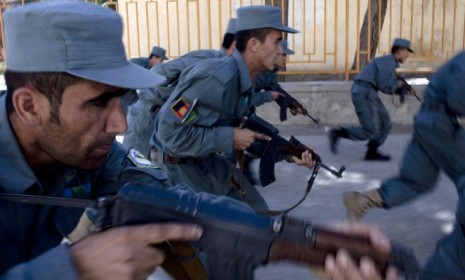The new Afghan security pact: What happens when U.S. troops leave?
Washington and Kabul agree to keep partnering for 10 years after Afghan forces take over security duties in 2014... but many kinks still need to be worked out

A free daily email with the biggest news stories of the day – and the best features from TheWeek.com
You are now subscribed
Your newsletter sign-up was successful
After more than a year of tense negotiations, the U.S. and Afghanistan have reached a draft agreement defining America's role in the country after U.S. and NATO troops officially withdraw in 2014. Neither side has released specifics of the deal, and President Obama and Afghan President Hamid Karzai have yet to approve the partnership framework, but an initial picture has emerged. Here, a brief guide:
What does the draft agreement say?
The U.S. is essentially pledging to support Afghanistan for another 10 years after the withdrawal of the bulk of U.S. troops. The deal is being touted as a signal — to both the Afghan people and insurgents — that the U.S. isn't going to abandon the fight against the Taliban.
The Week
Escape your echo chamber. Get the facts behind the news, plus analysis from multiple perspectives.

Sign up for The Week's Free Newsletters
From our morning news briefing to a weekly Good News Newsletter, get the best of The Week delivered directly to your inbox.
From our morning news briefing to a weekly Good News Newsletter, get the best of The Week delivered directly to your inbox.
How exactly will America "support" Afghanistan?
That remains to be worked out. For instance, Karzai has requested financial promises from Western countries — $2 billion a year from the U.S. alone — to support Afghan security forces, but many nations are waiting for the U.S. to make a long-term commitment before they sign on the dotted line. So while the agreement is a step in the right direction — for a while it looked like Washington and Kabul wouldn't be able to work out a deal at all — it will remain mostly symbolic until specifics regarding U.S funds and remaining troop support are hammered out.
Why were the negotiations so difficult?
Karzai refused even to participate for months, insisting that the U.S. first had to halt controversial night raids and hand over control of its main military prison. (Other deals removed these obstacles.) And negotiations were nearly scuttled repeatedly by a string of surprise setbacks, including the inadvertent burning of Korans by U.S. soldiers, a civilian massacre allegedly perpetrated by an American sergeant, and, most recently, the release of photos showing American soldiers posing with the corpses of Afghan insurgents.
A free daily email with the biggest news stories of the day – and the best features from TheWeek.com
So... how big of a breakthrough is this, really?
Plenty of hurdles remain, says Alissa J. Rubin at The New York Times, but this pact "builds on hard-won new understandings" the countries reached against long odds. Maybe, says Steve Hynd at The Agonist, but with so few details, all we're really doing is agreeing to disagree later, "raising suspicions that it's merely an attempt to paper over the cracks" ahead of a May 20 NATO summit.
Sources: Agonist, BBC News, New York Times, Washington Post
-
 How the FCC’s ‘equal time’ rule works
How the FCC’s ‘equal time’ rule worksIn the Spotlight The law is at the heart of the Colbert-CBS conflict
-
 What is the endgame in the DHS shutdown?
What is the endgame in the DHS shutdown?Today’s Big Question Democrats want to rein in ICE’s immigration crackdown
-
 ‘Poor time management isn’t just an inconvenience’
‘Poor time management isn’t just an inconvenience’Instant Opinion Opinion, comment and editorials of the day